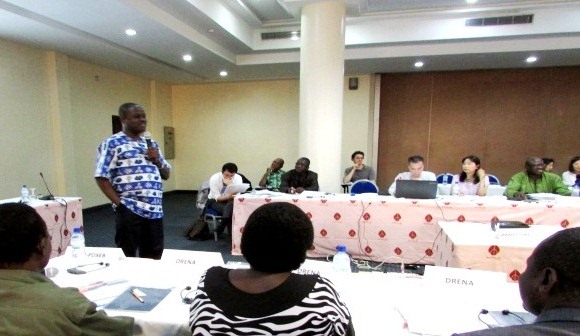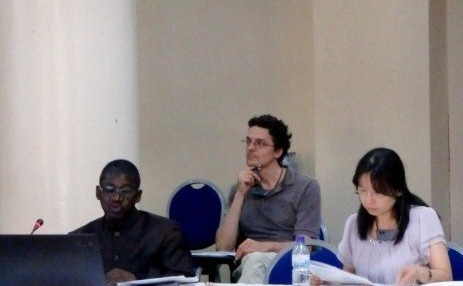JICA and the World Bank Hold a Seminar of Interim Report on the Research to Link Global Knowledge and Practices
2014.01.20
As a pillar of support for basic education, JICA has been promoting the establishment of a practical model for the improvement of school management by directly interacting with educational administration organizations, schools, and communities in each country. To share these field experiences systematically and to contribute the new research results to the enhancement of ODA support projects, JICA-RI is conducting a joint research with the World Bank (WB) on the theme of “System Assessment and Benchmarking for Education Results (SABER).”

With an aim of developing the new policy analysis tool, interview surveys were conducted with school principals, school management committees, parents’ associations, village offices, and prefectural and provincial education offices in Burkina Faso and Senegal, the research target regions, from April to May 2013.
On December 4, 2013, the Ministry of National Education and Literacy, WB, and JICA co-hosted an interim report seminar for the central and local government officials of Burkina Faso, donors, and NGOs.
At the beginning of the seminar, opening addresses were given by the respective officials of the Ministry of National Education and Literacy, WB, the Embassy of Japan, and JICA Office. Subsequently, Ms. Angela Demas, Senior Education Specialist of the WB Headquarters, and Mr. Kazuro Shibuya, a staff member of JICA’s Human Development Department, who was on a temporary assignment to the World Bank at the time, reported on the status of the progress of the entire SABER program respectively. WB’s SABER program aims to establish a database using indicators that have been developed based on international evidence. The SABER program also aims to utilize the database for political dialogues with the respective countries in connection with the “quality of policy,” which links the budget to the results of education. While WB and JICA have advanced the development of indicators covering several policy fields, it was reported that the indicators to measure the “quality of policy” pertaining to school management and accountability were improved based on the trial results of work that was carried out jointly with JICA during the preparation period for the research. Further, the development of analysis tool in relation to the “quality of policy implementation” is also a future challenge, which Ms. Demas referred to as the significance of the joint research with JICA.
Subsequently, on behalf of the joint research team, JICA Senior Research Fellow Takako Yuki and Professor Damien Lankoande of the University of Ouaga, presented the interim report related to the “quality of policy implementation.” The report was based on the surveys conducted in four regions of Burkina Faso. The participatory school management system has been implemented about five years since the law was established. They, however, pointed out that the only two regions where JICA technical cooperation (“School Management Committee Support Project / Le Projet d’Appui aux Comités de Gestion d’Ecole: PACOGES”) among four target provinces has implemented the policies.

JICA Senior Research Fellow Takako Yuki (right)
According to the analyses on only these two regions, Yuki and Prof. Lankoande touched on gaps among schools and regions in the area of: the contents and levels of the school management system; information on students’ school achievement surveys that the principals have; the roles and general abilities in the local administration; and the availability of management documents. Yuki also gave a report on the correlation between these gaps and learning achievements.
Furthermore, Ms. Yoko Matsutani, Chief Advisor to the JICA Technical Project (PACOGES), raising the cases of pilot schools, elucidated how activity plan and implementation through sharing information on learning achievements with the communities is linked to the improvement of the results of primary school graduation exams. Mr. Assane Badini of Planning Bureau of the Ministry of National Education and Literacy, a key person for the joint research, presented the implementation status of the basic education strategy (PDSEB2012-2021), the current state of the implementation monitoring mechanism at the central and local levels, and the issue of capacity development. Lastly, Mr. Masahiro Hara of the PACOGES phase 2 planning and investigation team explained that JICA plans to disseminate the model of the functional “School Management Committee (COGES)” throughout the country and to support the enhancement of the COGES coordination function of local governments.
The joint research team intends to prepare a final report based on the diverse opinions and information from this seminar, in order to contribute to the implementation and the monitoring of the education strategies of governments through the JICA projects. Making use of this trial experience, the project researchers aim to produce research papers for sharing with a wide range of people the usefulness of the new education system analysis tools as well as the significance of the outcomes.

事業事前評価表(地球規模課題対応国際科学技術協力(SATREPS)).国際協力機構 地球環境部 . 防災第一チーム. 1.案件名.国 名: フィリピン共和国.

事業事前評価表(地球規模課題対応国際科学技術協力(SATREPS)).国際協力機構 地球環境部 . 防災第一チーム. 1.案件名.国 名: フィリピン共和国.

事業事前評価表(地球規模課題対応国際科学技術協力(SATREPS)).国際協力機構 地球環境部 . 防災第一チーム. 1.案件名.国 名: フィリピン共和国.

事業事前評価表(地球規模課題対応国際科学技術協力(SATREPS)).国際協力機構 地球環境部 . 防災第一チーム. 1.案件名.国 名: フィリピン共和国.

事業事前評価表(地球規模課題対応国際科学技術協力(SATREPS)).国際協力機構 地球環境部 . 防災第一チーム. 1.案件名.国 名: フィリピン共和国.
scroll